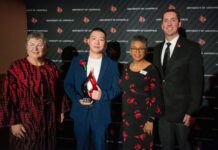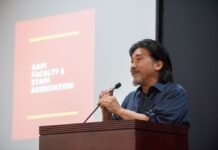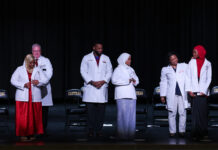
The University of Louisville is making strides not only in conducting cancer research, but also in educating and motivating the next generation of scientists.
The UofL Cancer Education Program is an intensive summer research and professional development program for outstanding undergraduate and health professional students, supporting their pursuit of careers in cancer research.
The UofL Cancer Education Program, funded by an R25 grant from the National Cancer Institute of the National Institutes of Health, accepts about 30 trainees each summer. The students engage in a 10-week research project under the guidance of UofL cancer researchers and lab mentors in basic, clinical, translational, behavioral and population-based cancer research. The mentors are research-intensive UofL faculty, most of whom are affiliated with the James Graham Brown Cancer Center.
This spring, the program was renewed for five years with the leadership addition of director LaCreis Kidd, PhD, MPH, associate professor and Our Highest Potential Endowed Chair in Cancer Research in the UofL Department of Pharmacology and Toxicology. David Hein, PhD, chair of the department, established the program and continues as director along with Kidd. More than 60 UofL faculty members serve as mentors and key contributors to the program.
“The renewal of this program is a clear indication that the trainees are excelling in cancer research during and after completion of the program. In addition, UofL and the James Graham Brown Cancer Center are providing cutting edge research, professional development and networking opportunities for the next generation of cancer research scientists,” Kidd said.
Since it began in 2012, the program has trained more than 150 students, including college undergraduates and medical, public health, dental and nursing students from more than 25 universities across the United States. More than one-third of the trainees have continued their studies as medical, doctoral and MD/PhD students at UofL. Others have continued their cancer research training at institutions such as Johns Hopkins University and Columbia. The five-year award of $1,593,000 supports the students’ research activities, subsistence payments, travel and housing.
To sharpen their professional skills, the trainees participate in engaging professional development activities. The activities include a 90-second elevator pitch contest, speed networking and public speaking activities that allow trainees to connect with their audience and deliver engaging oral presentations.
At the conclusion of the program, the students deliver their work in the form of research posters and oral presentations to faculty, judges and fellow students. Many of the students also present their research at Research!Louisville as well as at regional, national and international scientific meetings. Research conducted in the program is frequently published with a student as first author.
“The NCI R25 Cancer Education Program is well poised to prepare the next generation of young investigators in the field of cancer research or clinical oncology,” Kidd said.
One goal of the UofL NCI Cancer Education Program is to reach underrepresented minorities for participation. Of the 156 students who have completed the program, 53 are underrepresented minority students.
The Cancer Education Program is integrated with other summer research activities on UofL’s Health Sciences Center campus, including the Summer Research Scholar Program for students in the School of Medicine and the School of Dentistry’s Summer Research Program.
UofL Training Program in Environmental Health Sciences renewed
Another training program at UofL, the Training Program in Environmental Health Sciences, was renewed for a 5-year term with a $2.4 million T32 grant in late 2016 by the National Institute of Environmental Health Sciences. The program funds predoctoral and post-doctoral students on a full-time basis, incorporating numerous centers, institutes, schools and more than 50 faculty mentors to provide cutting edge basic, clinical, computational and population-based research.
Hein established this program in 2004 and served as principal director until 2016. With the program’s renewal, Gavin Arteel, PhD, professor and Distinguished University Scholar in the Department of Pharmacology and Toxicology, took over as director. The Training Program in Environmental Health Sciences supports six predoctoral and three postdoctoral trainees. Graduates of the program have gone on to positions in the Environmental Protection Agency, the Food and Drug Administration, the pharmaceutical industry, and as faculty members at UofL and other prestigious universities. Kevyn Merten, PhD, assistant vice president for research and innovation at UofL, was among the first graduates, completing the program in 2006.
“The grant renewal recognizes that the university supports a critical mass of research to support the training of students and postdoctoral associates in this area,” Arteel said. “Two very strong programs that we have are the Diabetes and Obesity Center and the Hepatobiology and Toxicology Program.”
Aruni Bhatnagar, Ph.D., Matthew Cave, M.D., and Hein serve as co-directors for the program.






























